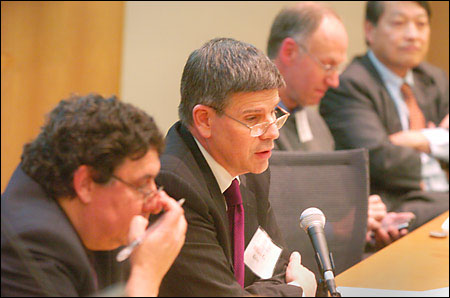Fairbank Center celebrates half century
Amid diverse points of view, all agree on significance of John King Fairbank

The 50th anniversary conference of the Fairbank Center for East Asian Research took place over three days (Dec. 9-11), attracting hundreds of scholars from around the world, who gathered to hear and participate in panels on China’s domestic politics, international relations, economy, social conditions, literature, and philosophical traditions.
At the opening session, each of the speakers had a unique perspective on the study of modern China, but there was one thing on which they all seemed to agree: the importance of the center’s founder, John King Fairbank.
Fairbank Center Director Roderick MacFarquhar called him “the godfather of the study of modern China.” Yale history professor Jonathan Spence attested to Fairbank’s pervasive influence in the field as he was beginning his graduate studies in the 1960s. And Philip Kuhn, the Francis Lee Higginson Professor of History and of East Asian Languages and Civilizations, spoke of how Fairbank influenced scholars and policymakers to take Chinese institutions seriously and move beyond ethnocentrism.
Fairbank, who died in 1991, might have dismissed such praise as excessive, although he would have certainly approved of the growth of the institution that has borne his name since 1977, the year of his retirement. For all his scholarly accomplishments, he tended to downplay his qualifications as a China expert.
In a 1979 interview, he gave a wry interpretation of the term “China specialist”: “Nobody knows anything about China, but this character has made a special effort. Maybe he’s got something amusing to say.”
In the same interview, Fairbank pointed out, “You don’t have England experts. You don’t have France specialists that you hear about in particular. It’s a more sophisticated situation there. It is rather primitive to have a China expert.”
Born in South Dakota in 1907, Fairbank earned an A.B. degree from Harvard in 1929. He first traveled to China in 1932, the year of Mao’s Long March. A member of the Harvard faculty since 1936, he was named the Francis Lee Higginson Professor of History and of East Asian Languages and Civilizations in 1959. He served as director of the East Asian Research Center from 1955 to 1973. With Edwin O. Reischauer, he inaugurated a survey course on East Asian civilizations familiarly known as “Rice Paddies.”
In the opening session, titled “Modern Chinese Studies From an Historical Perspective,” the three panel members spoke about their research in a way that suggested the scholarly study of China may have gone beyond the “primitive” beginnings Fairbank described.
Spence related how his interest in Mao’s 1949 revolution led him to investigate earlier periods of turmoil and upheaval in Chinese history, particularly the long and eventful reign of Emperor K’ang-Hsi (1661-1722), which he considers the beginning of the history of modern China.
Kuhn spoke about the need for a “China-centered historiography, leading to a broader story that emphasizes Chinese agency.” For example, the opening of China to Western trade, beginning in 1511 with the Portuguese establishment of a trading post in the Moluccas, can also be seen as the expansion of the Chinese maritime community and as a bid to avoid the control of the mainland bureaucracy.
Wellesley College history professor Paul Cohen spoke about the difficulty of defining basic terms. In a country that includes many ethnic groups, comprising different languages and religions, how does one even define “Chinese”? Other issues remain similarly ambiguous, such as the meaning of nationalism, attitudes toward modernity and democracy, even the dates traditionally assigned to key events. But as access to Chinese historical materials continues to improve and as opportunities for communication between Chinese and Western scholars multiply, these issues at least may be examined more carefully.
To a large degree, the Fairbank Center has been responsible for increasing such opportunities by supporting research and promoting scholarly exchange. As MacFarquhar said, if Fairbank could observe the center on its 50th anniversary, “He would be glad to see the acorn he planted as the mighty oak it has become.”




